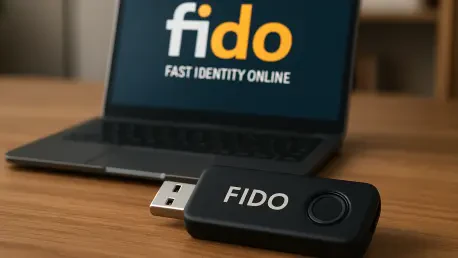Nearly every day, society faces new challenges from innovative cyber threats, urging technology to adapt faster than before. One emerging concern is the tactic by a threat actor known as “PoisonSeed,” which attempts to bypass secure authentication systems, particularly targeting Fast Identity Online (FIDO) security keys used by organizations. Though FIDO keys are widely praised as the gold standard for secure, non-password authentication, PoisonSeed’s attack method reveals potential vulnerabilities that require attention to maintain robust security. This review delves deeper into the technology, its core features, performance efficiency, and the scope of its application across various sectors.
Understanding FIDO Technology
FIDO security keys stem from a principle aiming to replace conventional password-based systems with advanced authentication methods that are more resistant to phishing attempts and other threats. These keys are part of an overarching trend in cybersecurity designed to fortify defenses by relying on cryptography instead of passwords. They hold significant importance in the current technological landscape due to their capability to elevate security standards across multiple platforms and devices. The proliferation of cyber threats has made FIDO technology a critical asset as organizations strive to protect sensitive data and systems.
Core Features and Performance
Phishing-Resistant Authentication
A standout feature of FIDO security keys is their adeptness at thwarting phishing attacks, providing a layer of defense against unauthorized access. This becomes increasingly vital as attackers refine methods to replicate legitimate interactions. The mechanism involves cryptographic systems generating unique keys for user identification, mitigating common phishing traps. Understanding the effectiveness of these keys in safeguarding organizational assets, especially with actors like PoisonSeed attempting circumvention, highlights their significance.
Physical Security Keys
FIDO security keys are tangible objects used by consumers and businesses alike to secure accounts and systems. These keys are exceptionally durable and perform efficiently across various environments, providing a reliable authentication method. Their physical nature requires presence, adding an extra layer of security as they operate, ensuring only authorized users access protected systems or data. The real-world deployment of such keys demonstrates their practicality in everyday operations, as they seamlessly integrate into established security protocols.
Recent Developments and Trends
The cybersecurity landscape is dynamic, constantly evolving to counter the rise of sophisticated attack strategies. FIDO technology continues to adapt, with new innovations seeking to outpace threats like those posed by PoisonSeed. This evolution reflects growing consumer demand for fortified security, prompting features such as multi-factor authentication options and improved cross-device compatibility. As industries shift toward embracing digital security frameworks, FIDO keys remain a vital component, propelling advancements in securing personal and corporate data.
Practical Applications of FIDO Keys
FIDO keys find extensive application across various sectors, including finance, healthcare, and technology. They play a pivotal role in corporate settings where secure login procedures are paramount. Those sectors often need reliable methods to protect critical information and systems from unauthorized access. Notable implementations include integrating FIDO keys in personal security protocols, enabling individual users to shield personal data and accounts effectively. These security keys showcase their versatility in adapting to specific environment needs, ensuring consistent protection.
Challenges and Limitations
Despite their robust design, FIDO security keys face challenges concerning implementation and user adoption. Organizations may encounter technical hurdles in integrating these keys within existing frameworks, while regulatory environments could impose restrictions that complicate widespread usage. Market obstacles, including user skepticism and the cost of implementation, present further challenges in gaining acceptance. Development efforts continue to address these concerns, striving to streamline integration processes and expand usability across diverse markets.
Prospects for FIDO Technology
Looking ahead, FIDO technology presents an array of possible breakthroughs that promise to redefine cybersecurity. Innovations targeting cross-device authentication, reducing complexity in implementation, and improving overall security provide grounds for optimism. Such advancements hold the potential to cement FIDO technology’s place in the industry’s future, impacting societal approaches to maintaining security. Long-term implications suggest FIDO keys may reshape security paradigms while ensuring reliable protection mechanisms endure alongside evolving threats.
Conclusion and Future Insight
In retrospect, the review underscores FIDO security keys’ pivotal role in modern defenses against increasingly cunning cyber threats. Despite challenges such as those highlighted in the PoisonSeed incident, these keys remain integral to security infrastructure. A future filled with innovative developments and smarter defenses beckons as FIDO technology evolves in response to new threats. This trajectory suggests a continued emphasis on strategic thinking around security protocols and technologies, urging organizations worldwide to adopt layered and proactive cybersecurity measures to ensure robust protection.









